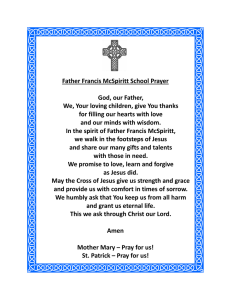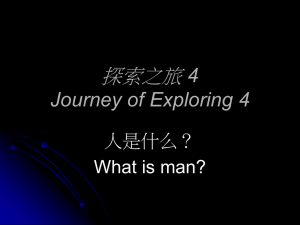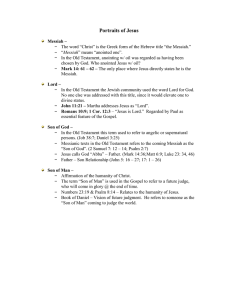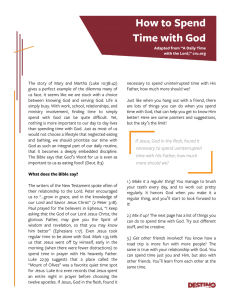Homily for the Feast of the Baptism of the Lord January 10, 2016
advertisement
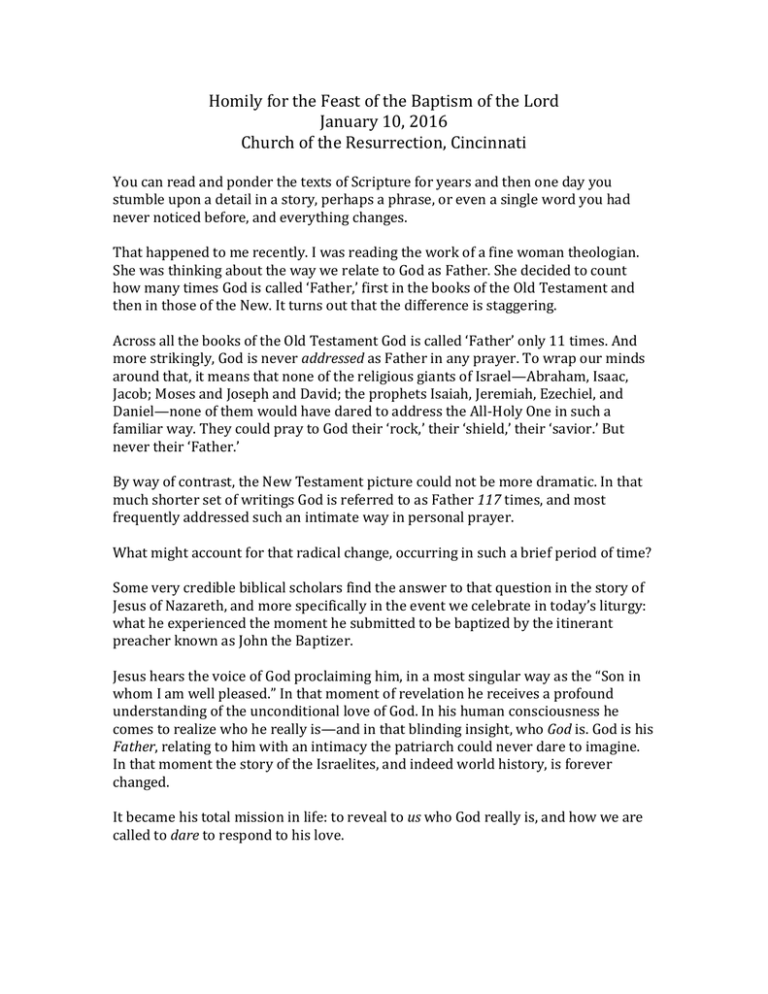
Homily for the Feast of the Baptism of the Lord January 10, 2016 Church of the Resurrection, Cincinnati You can read and ponder the texts of Scripture for years and then one day you stumble upon a detail in a story, perhaps a phrase, or even a single word you had never noticed before, and everything changes. That happened to me recently. I was reading the work of a fine woman theologian. She was thinking about the way we relate to God as Father. She decided to count how many times God is called ‘Father,’ first in the books of the Old Testament and then in those of the New. It turns out that the difference is staggering. Across all the books of the Old Testament God is called ‘Father’ only 11 times. And more strikingly, God is never addressed as Father in any prayer. To wrap our minds around that, it means that none of the religious giants of Israel—Abraham, Isaac, Jacob; Moses and Joseph and David; the prophets Isaiah, Jeremiah, Ezechiel, and Daniel—none of them would have dared to address the All-Holy One in such a familiar way. They could pray to God their ‘rock,’ their ‘shield,’ their ‘savior.’ But never their ‘Father.’ By way of contrast, the New Testament picture could not be more dramatic. In that much shorter set of writings God is referred to as Father 117 times, and most frequently addressed such an intimate way in personal prayer. What might account for that radical change, occurring in such a brief period of time? Some very credible biblical scholars find the answer to that question in the story of Jesus of Nazareth, and more specifically in the event we celebrate in today’s liturgy: what he experienced the moment he submitted to be baptized by the itinerant preacher known as John the Baptizer. Jesus hears the voice of God proclaiming him, in a most singular way as the “Son in whom I am well pleased.” In that moment of revelation he receives a profound understanding of the unconditional love of God. In his human consciousness he comes to realize who he really is—and in that blinding insight, who God is. God is his Father, relating to him with an intimacy the patriarch could never dare to imagine. In that moment the story of the Israelites, and indeed world history, is forever changed. It became his total mission in life: to reveal to us who God really is, and how we are called to dare to respond to his love. When his disciples ask him how they should pray he doesn’t tell them to pray to God their rock or their shield or the eagles under whose wings they are protected. He says simply: “say ‘Our Father’.” No flowery language. It’s unadorned, direct. I wonder if we can ever appreciate how revolutionary those words are? He tells them they could never arrive at that vision on their own: “No one knows the Father except the Son and those to whom he reveals him.” On the night before his own death, when he wants to leave them his final statement of who he was and what he was about, the evangelist John gives us his great discourse. It covers three full chapters of John’s Gospel. And it’s all about the One he calls ‘Father.’ And finally when Mary Magdalen tries to hang onto him in the garden he says, “Go to my brothers and tell them, ‘I am going to my Father and your Father, to my God and your God.’” His Father is our Father. Why does this spell-blinding revelation take place precisely at this particular moment? John was baptizing ordinary sinners—like you and me—when Jesus quietly took his place in line. He didn’t stand out; he didn’t stand on any privilege. In fact, when the line finally reached him John looked up and was shocked. “What are you doing here?” And Jesus has to tell him in effect, “Just do what needs to be done.” He identifies himself totally with sinful humanity. And it is at that moment that he is ‘most pleasing,’ the Spirit is upon him, and the Father reveals Himself. It’s interesting to see how he is depicted in one of the church’s earliest writings. The Letter to the Philippians comes while there were still eye-witnesses to his life around. Paul introduces a hymn they were already singing, long before there were any written Gospels. Presumably it was trying to capture what had moved and attracted them about him. What was it that made him so unique for them? They don’t sing of his miracles, or even his teaching. Instead they celebrated the fact that, Though he was in the form of God, he did not regard equality with God something to be grasped. Rather, he emptied himself, taking the form of a slave, coming in human likeness, and found human in appearance, he humbled himself, becoming obedient to death, even death on a cross. Because of this. God greatly exalted him and bestowed on him the name that is above every name, that at the name of Jesus every knee should bend, of those in heaven and on earth and under the earth, and every tongue confess that Jesus Christ is Lord, To the glory of God the Father. His mission has become ours: to show forth the Fatherhood of God by following the example of the Son, emptying ourselves for our brothers and sisters. John tells us we are already children of God. Already, not in some unknowable future. So as we come to the altar of the Lord we join our efforts to the life of the Son who is our Brother and ask that through that holy food and drink we may be given an ever richer sense of the dignity that is ours, the awesome intimacy offered to us in Baptism by the One he called ‘Father.’

